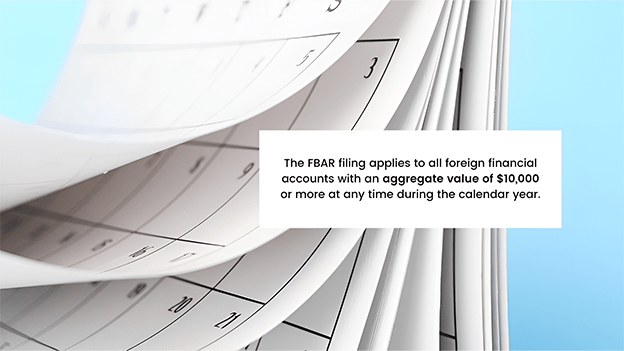What is FBAR?
Written by John Woodfield, Portfolio Manager, CIM®CFP®

If you're a U.S. citizen living abroad, you likely have assets in your new country of residence.
For example, if you're a U.S. citizen living in Canada, you likely have one or more Canadian bank accounts. If your Canadian accounts add up to $10,000 or more at any time during the year, you'll need to file an FBAR report. This post will cover the FBAR and why you must do FBAR reporting.
Please note this article is not advice and is for information purposes only. You need to speak to your cross-border accountant about your particular situation.
What Is FBAR Reporting?
FBAR stands for Report of Foreign Bank and Financial Accounts. FBAR reporting refers to the requirement imposed by the U.S. Department of the Treasury's Financial Crimes Enforcement Network (FinCEN), whereby individuals and businesses with signing authority over foreign financial accounts must report those accounts each year.
Report of Foreign Bank and Financial Accounts and Why It Matters
Remaining onside with U.S. law and compliance is vital because you don't want to have issues with the IRS.
U.S. citizens and other entities with signing authority over foreign financial accounts are required by law to report annually if the aggregate value of the accounts exceeds $10,000 at any point during the year. The FBAR exists to prevent financial crime. Failure to comply can lead to severe penalties.
When filing an FBAR, you must report foreign bank holdings, mutual funds, and brokerage accounts. You may also have to report foreign pensions.

What Is FBAR Filing?
An FBAR filing refers to the process of submitting a Report of Foreign Bank and Financial Accounts (FBAR) to the U.S. Department of the Treasury's Financial Crimes Enforcement Network (FinCEN). We've written a comprehensive blog post about FBAR filing, so if you need to file, refer to the post on FBAR filing here.
Who Needs to File an FBAR?
If you're a United States person who has a financial interest or signature authority over any foreign financial accounts with an aggregate value of $10,000 or more at any time during the calendar year, then you must file the FBAR. You can do this electronically or have your accountant do it for you.
If you decide to do this independently, you'll need the filing guide linked below.
Does FBAR Filing Apply to All Foreign Financial Accounts?
The FBAR filing applies to all foreign financial accounts with an aggregate value of $10,000 or more at any time during the calendar year.
Let's say you have $9000 in a foreign bank account for most of the year, but suddenly receive an unexpected deposit that brings your account balance to more than $10,000 for a few days. You'll still have to file an FBAR.
In addition, there are no foreign financial institutions that are exempt. It doesn't matter where the bank account is held; you'll still need to file an FBAR if your account exceeds $10,000 at any point during the year.

FBAR Deadlines
The annual FBAR filing deadline is April 15th. But there is an extension available until October 15th upon request.
The Basics of How to File FBAR
FBAR filings are done electronically using FinCEN Form 114. The information required includes account details and the maximum value during the year.
FBAR Forms
FinCEN Form 114 is the only form needed to report foreign financial accounts.
FBAR Thresholds
Accounts with over $10,000 at any point during the year trigger the FBAR filing requirement.
Getting Representation for FBAR Issues
If you have a complex case or detailed questions, seek professional assistance from tax advisors or attorneys specializing in international tax law.
FBAR Penalties
Penalties for non-compliance or inaccurate reporting are not a joke. You may be given a fine. Or if it is determined that you were intentionally evading taxes, you could receive criminal charges. These can be severe, depending on the severity of the violation and intent.
Delinquent FBAR Filing
When there is unintentional non-compliance, there are procedures for delinquent FBAR filing that should mitigate penalties. It is crucial to act promptly upon discovery of an oversight.
Beyond FBAR: Cross-Border Pitfalls Common to Americans Living in Canada
As an American living in Canada, FBAR reporting is just the tip of the financial planning iceberg. If you have substantial assets, you must have a team of cross-border experts to help you navigate the complexities of cross-border wealth. Ensure your team includes a cross-border wealth management team, a cross-border accountant, and a cross-border lawyer.
Below is a critical cross-border to-do list that is particularly important for U.S. citizens in Canada who want to be in control of their finances:
- Know the implications of being taxed in both countries,
- Understand how to report foreign income and navigate tax treaties,
- Manage investments and retirement accounts in compliance with the IRS and CRA,
- Manage cross-border wealth so that you don't overpay your taxes or create estate planning issues,
- Monitor your cost base so that, when you do sell any investments, your capital gains are taxed correctly,
- Seek advice from professionals well-versed in cross-border wealth management.
Cross-Border Wealth Management for U.S. Citizens With Assets in Canada
Navigating the intricacies of cross-border wealth management for U.S. citizens living in Canada requires a comprehensive understanding of tax laws and regulations, and the ability to enact strategies that align with specific financial goals. Seeking professional advice from cross-border financial experts and tax advisors can significantly assist in navigating these complexities and ensuring compliance.
Common Questions About FBARs
What does FBAR stand for?
FBAR stands for Report of Foreign Bank and Financial Accounts.
Does FBAR need to be filed every year?
Yes, an FBAR must be filed each year.
What is the purpose of an FBAR?
The purpose of an FBAR is to report foreign financial accounts. It is designed to prevent money laundering and other financial crimes.
Who is exempt from FBAR filing?
Some foreign financial institutions, governmental entities, and international financial institutions may be exempt.
Do you pay taxes on FBAR?
The FBAR is not a tax. It is simply a reporting requirement.
What triggers an FBAR?
Holding foreign accounts exceeding $10,000 at any moment during the year triggers the requirement to file an FBAR.
What accounts are reported on FBAR?
When filing an FBAR, the accounts you must report include bank holdings, mutual funds, and brokerage accounts. It can also include foreign pensions.
Next Steps
If you’re a Canadian resident or are planning on moving to Canada and need assistance with moving and optimizing your investments, estate planning, wealth management and portfolio management, please get in touch. At SWAN Wealth, we specialize in Canadian financial planning, cross-border financial planning and cross-border wealth management.
Tax Planning Articles and Guides for Canadian Residents
If you’re planning a cross-border move, these articles and guides will help you simplify your move and ensure you’ve covered everything.
Foreign Tax Credits in Canada and the U.S.
Certified Financial Planner in Canada - Finding a Fiduciary
How to Reduce Taxes for High Income Earners in Canada
Is a 401(k) Taxable in Canada?
About the Author
John Woodfield is a Financial Management Advisor (FMA), a Chartered Investment Manager (CIM), and a Certified Financial Planner (CFP), and in 2007, was inducted as a Fellow of the Canadian Securities Institute (FCSI). As a portfolio manager and CFP®, he works with clients across Canada. John’s clients are families, individuals and business owners who understand the importance of comprehensive wealth and investment plans driven by the lifestyle they want to lead.
Schedule a Call
Schedule a 15-minute introductory call with SWAN Wealth Management. Click here to schedule a call.





